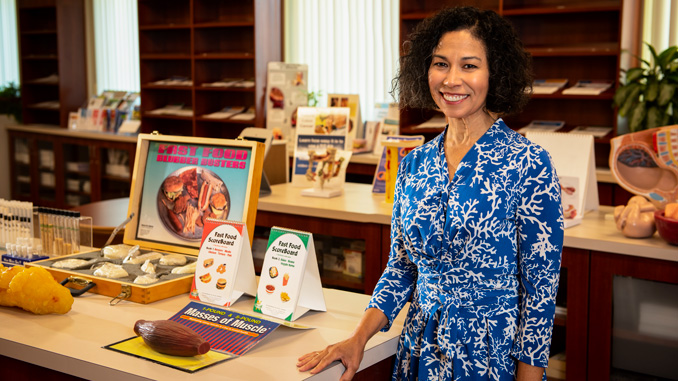
There is no single definition of self-care. For everyone, it means something different. Ultimately, it’s about remembering to take the time to care about one’s self physically, mentally, and emotionally. For some, this is as simple as a trip to the spa or a hot bath and a good book. Other types of self-care mean routine health screenings, proper nutrition, consistent exercise routines, and therapy. We talked with local female healthcare workers from some of the area’s most prestigious hospitals to learn how we can best practice self-care in our daily lives to become the best possible versions of ourselves.

Nutrition
At its core, self-care refers to the ways in which we take care of ourselves. Eating healthy, getting exercise, spending time outdoors—it all equates to a better, and overall healthier, self.
“Self-care is honoring oneself, taking the time to build the harmony of mind, body, and spirit,” says Raquel Moreno, a registered dietician and health education manager at Kaiser Permanente Medicine in Stockton.
Eating healthier fuels the body and puts us on a better trajectory for health. When we eat well, we feel more energized and alert, we are better equipped to take on our days and our responsibilities, and, in the end, we accomplish more by taking time out to focus on personal health.
“Healthy eating is one of the most important parts of taking care of ourselves. When we eat wholesome, nutrient-rich food (whole grains, fruits, nuts, vegetables, lean meats), we are showing respect for our bodies,” Raquel says.
Those looking to eat healthier (and reap the benefits of a good diet) should limit their intake of processed foods and look to organic, nutrient-rich foods grown locally. It’s a mission Kaiser Permanente supports by offering weekly farm stands at its clinics in Manteca and Stockton where patients can pick up locally grown fruits and vegetables.
Perhaps the easiest way to cut down on unnecessary calories and sugars is to replace sugary drinks with water, flavored water, and seltzers. These are much better for you than juice or soda.
“Cooking should not take over your life,” Rosario Aguirre, a registered dietician at Kaiser Permanente, says. “Plan smart by using pre-cooked grilled lean meats… vegetables and fruits usually require very little preparation. Consider using a slow cooker to save time, and for a delicious hot meal.”
These may sound like the typical rules for healthy eating, and that’s because, for most people, they are the standard. However, it’s important to remember that our bodies are all unique and what works for one person isn’t a guaranteed slam-dunk for the next.
Sometimes self-care isn’t only about what you are eating, but how you are eating it.
“I always tell patients that one of the best ways to manage your well-being is through intuitive eating,” says Christina Ellis, a clinical dietician at St Joseph’s Medical Center. “Take time out of your day to sit down and enjoy those meals!”
By rushing through meals or being too busy to adhere to a normal eating schedule, women are often missing those hunger and fullness cues that should dictate eating patterns. By sitting down to enjoy meals instead of rush through them, you’re more likely to eat to satisfaction instead of participating in mindless eating or eating based off emotion, which then often leads to overeating and unintentional weight gain. “It is important to identify these food triggers, find alternative ways to manage these emotions, and work on prioritizing planned mealtimes,” Christina says.
“One of the questions I like to ask during our first session is ‘when is the last time you sat down for at least 20 minutes and really enjoyed a meal without distraction?’ Nine out of ten times, the clients cannot recall, or if they can, it has been a very long time,” Christina says.
The mental break of stopping what you’re doing to eat a meal is good for overall health, too.
“I also encourage members to be mindful of the way any food makes them feel afterward,” Raquel says.
For many, processed foods make people feel sluggish or not satisfied. A feeling of still being hungry after a large meal is indicative that it doesn’t contain the nutrients needed for the body to function. However, for some, items like lactose may cause brain fog or an upset stomach, while for other dairy products don’t affect them. The same can be said for those who react poorly to garlic, onions, or salt. It’s really all about knowing what’s good for you personally.
These issues are common for most people, but women run into another problem when it comes to finding the time to meal prep, plan, and shop.
“Any woman can feel overwhelmed, stressed, or depressed at times when trying to balance all their responsibilities,” Raquel says. “These feelings can sometimes prevent women from taking action to help themselves.”

Physical Health
Overall physical health is a big part of self-care. Having regular checkups, following up with your primary care doctor, and making your health a priority is all part of taking care of yourself.
“There are so many reasons that self-care is important for everyone, but specifically for women it’s crucial because we are so busy,” says Dr. Anureet Gill, a family care physician with Dignity Health Medical Group. “The busier you are, the more likely you are to put your self-care on the back burner.”
Dr. Susan Areeckal, a general practitioner at Kaiser Permanente Central Valley service area, says women need to stop prioritizing work over family and themselves.
“I can be a real hypocrite,” she admits about not making time for her own self-care. “I find small moments of happiness that help me unwind. Pay it forward moments at the cafeteria, calling someone on my short drive home, snuggling my kids a little longer, getting my hair done.”
The “me comes last” mentality that many women adopt as they care for spouses, children, aging parents, and friends, isn’t going to allow them to continue the cycle of care. As they burn out, those relationships with others will suffer, too. It takes being healthy to maintain that busy schedule.
“Think of self-care as personal maintenance,” Anureet says. “A lifestyle that doesn’t allow you to take time for yourself is truly unsustainable.”
Physical health plays into every other component of health there is. For example, if you’re not physically healthy, the stress of being rundown can cause mental health issues. When you’re sick, you’re also not able to participate in those activities that bring balance to your life such as exercise and meal prep.
“Everyone must take a few moments every day for self-care. This includes physical exercise, self-awareness, affirmation, and stress reducing activity that provides them some joy,” suggests Mary Raymond, a nurse practitioner at Dameron Hospital.
Want to get on track? Start small and cover the basics. Get enough sleep, eat healthy foods, drink plenty of water, and schedule regular check ups including cancer and diabetes screenings and annual OBGYN appointments.
Anureet says the biggest problem women have maintaining physical health is their inability to put themselves first—or often second or third either. They bring their family members including parents, children, and spouses into the doctor routinely, but when Anureet asks the last time they went to a doctor, it’s been way too long.
“This is a real problem, and by far the biggest mistake women are making when it comes to their health [is] they aren’t making time for themselves,” she says. “To be honest, when my children were little, I too struggled with self-care. But one day, I decided to make a serious change, and make self-care a priority.”
To set a good example for her children, Anureet started prioritizing exercise by getting in thirty minutes five days per week. She also made time for activities with her children such as bike rides and park trips. The result? More energy.
If it feels overwhelming, start with just ten minutes per day dedicated to your own self-care. This time can be used to schedule annual physicals or other appointments. It can even be used to read a book or engage in a quick aerobic exercise.
“Once you start prioritizing time for self-care, I think you’ll notice you’re able to find more and more time throughout the day for yourself,” she says.
Changing how you treat and view yourself can also help and counts as its own form of self-care. Reject the perfect image you’re striving for and instead find contentment in what you are able to give yourself and others.
“There is rarely time left for self-care. In order to be happy, one must take time for self-love,” Mary says. “One of the biggest mistakes is self-neglect. This often results in resentment, fatigue, and burn out emotionally.”
Happiness is one of the most important components of self-care and self-love. Creating a happy home life will make it easier to be physically and mentally healthy, which includes surrounding yourself with positive relationships.
Mary’s other big advice? Find beauty on the inside. Take care of yourself from the inside out and you will be satisfied with what you see in the mirror. The same type of gratitude is not found in costly cosmetic procedures and other “quick fixes.”
“It can be very discouraging to a woman when she compares herself to unrealistic images of the ideal female figure portrayed by the media,” Mary says.

Mental Health
Feeling good is part of being healthy. Many women maintain busy schedules packed with appointments and responsibilities that can become overwhelming. And with that extensive to-do list comes a sense of dread that can seriously mess with your psyche, potentially contributing to anxiety, depression, and or destructive behaviors.
“Some women can become resentful as their personal needs get neglected. They need to recognize taking care of one’s self is not being selfish,” says Dr. Shabneet Brar, adult, child, and forensic psychiatrist at San Joaquin General Hospital. “Be your own best friend. Be more attuned to your needs, problems, and goals. Be generous toward yourself.”
Self-care acts as a way to recharge and create the ability to function well in all aspects of life. For many, it’s about finding balance in the day to day to make tasks feel manageable and, most importantly, life feel enjoyable.
“I think self care is important to everyone but… women tend to wear many hats in life,” says Dr. Amanjot Deol, chief of behavioral health at Kaiser Permanente Central Valley service area. “It is very important for women to have a routine and/or process to take care of themselves in order to balance all these roles.”
When we’re constantly running from ballet practice to dentist appointments, finding time for meal planning and piles of laundry, that burnout seems inevitable, but with proper self-care women can forgo the burn out, revitalize their energy, and create balance. Self care “can help prevent burn out that can ultimately lead to concerns such as depression, anxiety, and substance abuse,” Amanjot says.
In addition to exercise and healthy eating habits, dedicate yourself to meditation, deep breathing, yoga, or another hobby that brings you peace. The key is to choose an activity that fits into your lifestyle, so it is easy to maintain and there are no valid excuses to not follow through.
And remember, just because it’s called self- care doesn’t mean it has to be done alone. “I find that many women enjoy social connection. So try to find a hobby where you can socialize and meet others,” Amanjot suggests. From enrolling in gym sessions to planning a weekly game night or even joining a bowling league or book club, there are many ways to reboot and recharge while connecting with others.
Sometimes, women need help finding this balance or adjusting to a more positive mindset. For many, confiding in friends and family can provide the type of support and release needed. In other cases, however, seeking help from a mental health professional is needed.
“Women should reach out if they are experiencing symptoms that are interfering with their lives,” Shabneet explains. If you experience a significant change in mood, increased anxiety, an inability to cope, loss of interest in activities you used to enjoy, feelings of disconnection to others, a desire to isolate, or increased drinking/substance use as a way to cope, reach out to your physician and see what mental health resources are available to you.

